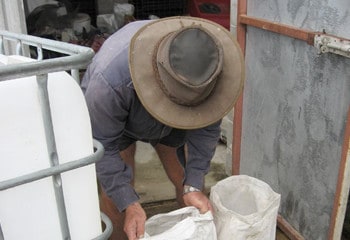Compost tea and bio fert in sugarcane
In order to sufficiently test the use of compost tea in sugar cane production, the Ottone’s are trialling replacing their use of topdress fertiliser in plant cane with compost tea, bio fert and molasses.
With their father Joe having retired, third generation sugarcane growers Michael and brother Peter now run the Ottone and Sons’ 194 hectare family farm at Bilyana, south of Tully.
Since purchasing the property in 1968, Ottone and Sons has grown pineapples, and bananas were produced up until 2003. Michael and Peter started work on the farm in 1980.
The Ottone’s have also received funding through the federal government’s Reef Rescue program to improve their farming practices.
Michael’s investigation for Project Catalyst stems from this background in tropical fruit.
Having used compost tea to control phytophthora fungus on their pineapple crop with great success, Michael is interested in testing the potential benefit of using it and Bio Fert on their cane crop.
Issues being addressed
The Ottone’s use of compost tea to control phytophthora fungus in their pineapple crop has been a great success, reducing costs and making them far less reliant on fungicides.
They believed that compost tea did more than control fungus, also improving soil health. They are investigating the question of what the benefit would be from using compost tea on their cane crop.
Solutions being tested
In order to sufficiently test the use of compost tea in sugar cane production, the Ottone’s are trialling replacing their use of topdress fertiliser in plant cane with compost tea, bio fert and molasses. In 1st ratoon the nitrogen was reduced to 33kg/ha and the brew applied. Plant cane and 1st ratoon harvest results have now been collected, economic analysis has not yet been completed.
The Ottone’s are also interested in doing more trials in the future, whereby they will test the suitability of using compost tea to replace the use of fungicide at planting.

